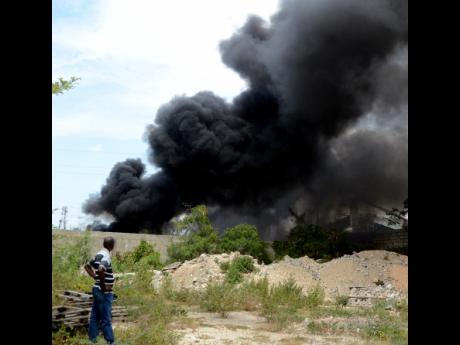Smoke health hazard - What to know and do to minimise effects of environmental fires
Smoke from environmental fires is a major health hazard, causing a number of harmful effects on the body. Unfortunately, over the past few weeks a high percentage of the population has been battling the health risks associated with fires, as sections of Jamaica have been blanketed with heavy smoke from fire at four major dumps - Riverton City in St Andrew, Retirement in St James, Haddon in St Ann, and Morant Bay in St Thomas.
Here is what you need to know and what you can do to reduce the harmful effects.
WHAT YOU NEED TO KNOW
- Smoke released from waste has a mixture of particles and chemicals produced by incomplete burning of carbon-containing materials. All smoke contains carbon monoxide, carbon dioxide and particulate matters.
- Smoke can contain many different chemicals, including aldehydes, acid gases, sulfur dioxide, nitrogen oxides, polycyclic aromatic hydrocarbons (PAHs), benzene, toluene, styrene, metals and dioxins. The type and amount of particles and chemicals in smoke varies, depending on what is burning, how much oxygen is available, and the burn temperature.
- Inhaling smoke for even a short time can cause immediate (acute) effects. Smoke is irritating to the eyes, nose, and throat, and its odour may be nauseating.
- Studies have shown that some people exposed to heavy smoke have temporary changes in lung function, which makes breathing more difficult.
- Two of the major agents in smoke that can cause health effects are carbon monoxide gas and very small particles.
- Inhaling carbon monoxide decreases the body's oxygen supply. This can cause headaches, reduce alertness, and aggravate a heart condition known as angina.
- Fine particles are able to travel deeply into the respiratory tract, reaching the lungs. Inhaling fine particles can cause a variety of health effects, including respiratory irritation, coughing, wheezing and shortness of breath, and can worsen medical conditions such as asthma and heart disease.
- During increased physical exertion, cardiovascular effects can be worsened by exposure to carbon monoxide and particulate matter. Once exposure stops, symptoms from inhaling carbon monoxide or fine particles generally diminish, but may last for a couple of days.
- Clinical studies have also shown a link between air pollution and heart attack, stroke, high blood pressure and heart defects in babies.
- A study published in June 2014 in the Journal of Environmental Health Perspectives showed that air pollution can affect learning ability, short-term memory and impulsivity. It also showed that early exposure to air pollution can cause the same changes in the brain as schizophrenia and autism. It can also cause a type of brain damage called toxic brain encephalopathy or 'brain fog'.
- Exposure of pregnant women to air pollution may cause mental retardation in their babies. Babies may also develop sudden infant death syndrome (SIDS).
- There is also the potential for chronic health effects from exposure to the components of smoke. Long-term exposure to ambient air containing fine particles has been associated with increases in cardiovascular disease and mortality in populations living in areas with higher fine particulate air pollution.
- Frequent exposure to smoke for brief periods may also cause long-term health effects.
WHAT TO DO
- Exposure to high levels of smoke should be avoided. Individuals are advised to limit their physical exertion if exposure to high levels of smoke cannot be avoided.
- Individuals with cardiovascular or respiratory conditions (for example, asthma), fetuses, infants, young children, and the elderly may be more vulnerable to the health effects of smoke exposure.
- If your age or health status places you at greater risk from smoke exposure, you should speak with your doctor about alternative steps you can take when encountering smoky situations.
- Minimise all outdoor activities as much as possible.
- Persons living in and around the vicinity of the fire should close windows and doors to prevent excessive exposure.
- Persons who suffer from asthma and other respiratory illnesses should cover mouth and nose with a clean damp rag to protect themselves from inhalation of smoke and dust particles.
- Keep children indoors as much as possible; look out for any difficulty in breathing or any discomfort that your child may experience.
- Persons with illnesses such as heart or lung conditions and other chronic diseases should continue to take medications as prescribed.
- Anyone who is experiencing difficulty breathing, wheezing, tightness in the chest or any persisting or frequent symptoms that they think are associated with smoke exposure should seek urgent medical assistance.



